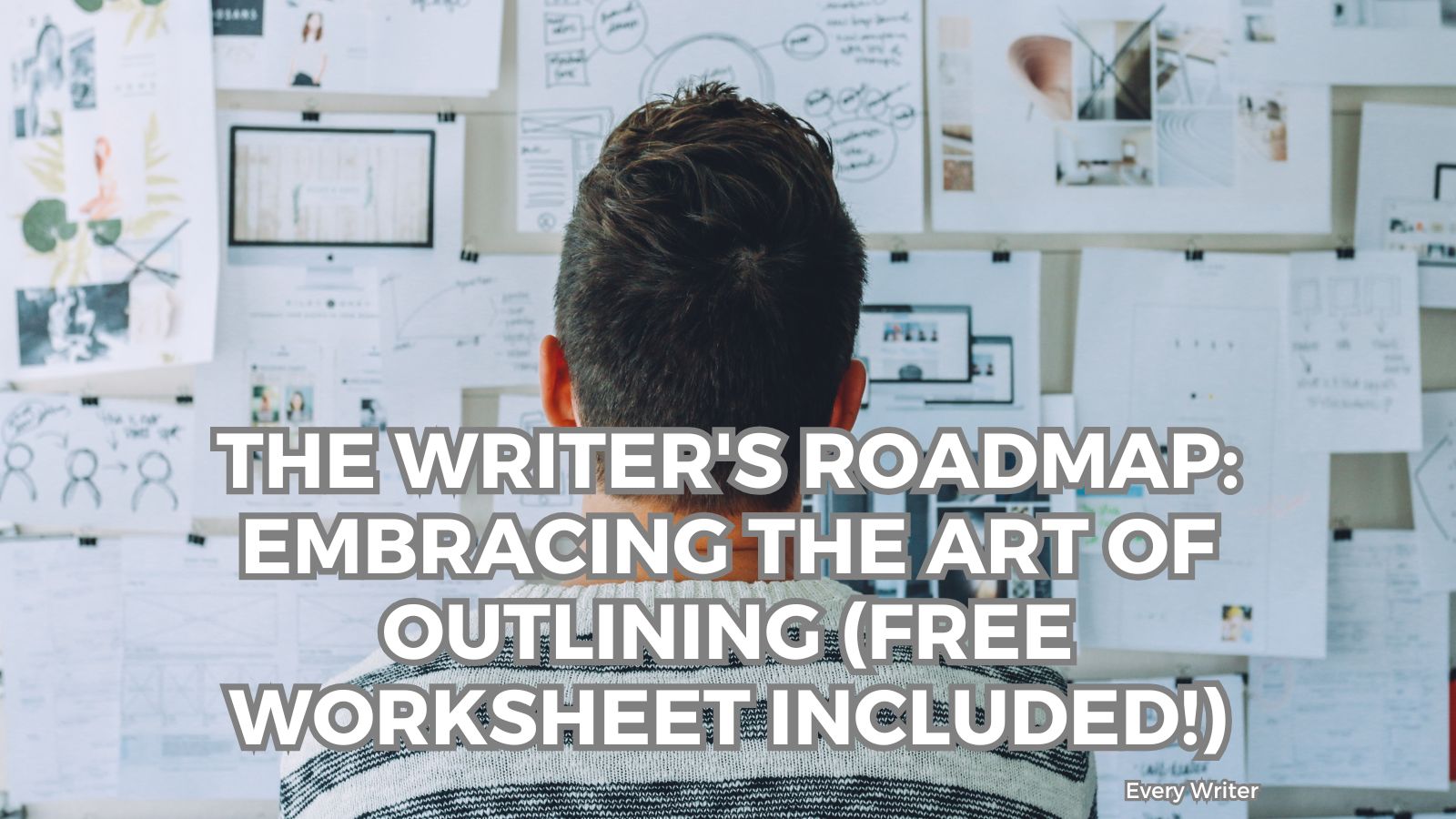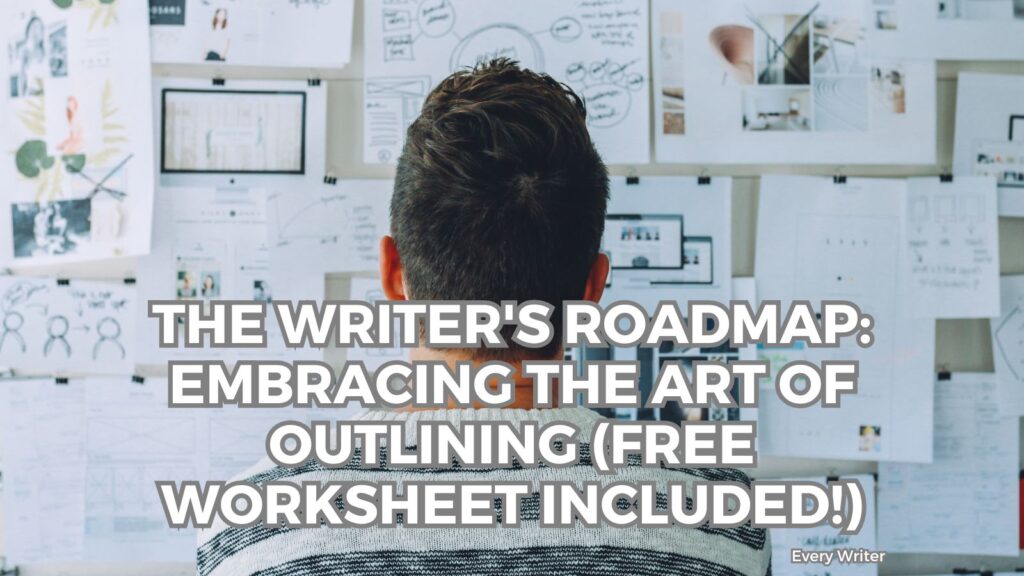The Writer’s Roadmap: Embracing the Art of Outlining (Free Worksheet Included!)
Hello, happy writers! I’m thrilled you stopped by to dig into the Every Writer’s well of free information. This time we have a free worksheet for you and some helpful tips and pointers on outlining your stories.
Yes, I know not every writer likes to outline. We may be split 50/50 on the issue—the eternal debate between “plotters” who meticulously plan every story beat and “pantsers” who prefer to discover the story as they write. The good news? Both approaches are completely valid creative methods! There’s no single “right way” to bring your stories to life.
But whether you’re a dedicated plotter or a die-hard pantser, we can all use a little help from time to time.. And let’s be honest—sometimes we might even switch up our writing methods depending on the project, our mood, or that looming deadline (tell no one).
For those who find themselves drawn to planning or struggling with unfinished projects, outlining can be an inspiring tool. It doesn’t have to be a creativity-killer or a rigid framework that boxes you in. Think of it more as a friendly roadmap that helps you navigate the sometimes chaotic journey of storytelling.
That’s why we’ve created this comprehensive story outlining worksheet as a practical resource for your writing toolkit. It’s designed to be flexible enough for both detailed planners and those who just want a few signposts along their creative journey. The best part? It’s completely free for you to download, print, and use for all your writing projects.
So if you’re here looking for a little help on getting started or constructing your story—plotter or pantser—this article is here to help. Let’s explore how outlining might just become your new secret weapon in bringing those brilliant story ideas to life.
The Benefits of Outlining: Why Some Writers Swear By It
So what’s all the fuss about outlining anyway? Why do some writers clutch their story plans like precious treasure maps while others run screaming at the mere mention of a plot point? Let’s talk about why the outline-lovers among us simply can’t imagine writing any other way.
Structure Without Suffocation
Think of outlining as giving your creativity some comfy boundaries to play in—not a straitjacket! It’s like having the walls of your house without deciding exactly where every piece of furniture must go. You know you’re writing a kitchen scene, but maybe your characters decide to have that heart-to-heart over coffee instead of during dinner prep. No problem! The outline gives you direction without micromanaging your muse.
“But my characters need freedom!” I hear you cry. Absolutely they do! And guess what? They can still surprise you within an outline. In fact, knowing the major landmarks often gives you more confidence to explore those delightful detours along the way. Your characters can still hijack scenes and speak their minds—they just might actually arrive at their destination instead of wandering in narrative circles for 50,000 words.
Efficiency in Storytelling
Raise your hand if you’ve ever written 30,000 words only to realize your plot has more holes than a slice of Swiss cheese. (My hand is way up high!) Outlining helps catch those plot holes and logical inconsistencies before you’ve invested weeks crafting beautiful prose around them.
With an outline, you can spot potential problems while they’re still easy to fix. That character who disappears halfway through? That motivation that doesn’t quite make sense? That contrived coincidence you were hoping nobody would notice? Address them in your outline, and save yourself hours of painful rewrites and deleted scenes that broke your heart to cut or worse discouraged you to the point that you quit the project.
Confidence Through Clarity
There’s something magical about sitting down to write knowing exactly where you’re headed. Writer’s block often comes from uncertainty—that terrifying “what happens next?” question that can paralyze even the most talented wordsmith. With an outline, you always have an answer.
When you know your protagonist needs to lose that crucial battle before chapter ten, or discover the betrayal by chapter fifteen, you can write with purpose. Each scene has direction. Each character interaction has meaning. You’re not just throwing words at the page and hoping they stick—you’re crafting each moment with intention, knowing precisely how it serves your larger story.
Complex Story Management
Let’s be honest—our brains can only juggle so many balls at once. If you’re writing a straightforward story with one character and one plotline, maybe you can keep it all up in the air. But add in multiple characters, subplots, themes, world-building elements, and foreshadowing? That’s a recipe for dropping some important narrative balls.
Outlining gives you a master control panel for all these moving parts. You can track character arcs alongside plot developments, ensure your subplots actually connect to your main story, and plant those brilliant seeds of foreshadowing that will bloom in your final chapters. Your readers will think you’re a genius—and your secret weapon was simply that handy outline keeping everything straight.
Getting Started: Making the Worksheet Work for You
Alright, you’ve downloaded our free worksheet (high five!). Now what? Let’s break down how to transform this collection of empty lines into your story’s blueprint without having a creative meltdown in the process.
What Each Section Actually Does
Our worksheet breaks down into four key areas that work together to build your story from the ground up:
- Story Basics: Think of this as your story’s birth certificate—the working title, genre, and target word count. The premise section is where you’ll capture the big-picture concept and what makes your story unique. Don’t stress if your title changes later (they almost always do!).
- Character Development: Here’s where your story’s heart beats. The protagonist section helps you understand who’s driving your story and why readers should care. Supporting characters and antagonists get their moment too—because every hero needs both friends and foes to shine.
- Conflict & Stakes: This is your story’s engine! What does your character want? What stands in their way? What happens if they fail? Without solid answers here, your story risks stalling out. Pay special attention to the “ticking clock” question—urgency keeps readers turning pages!
- Scene Breakdown: Consider this your road trip itinerary. The ten key scenes create your story’s backbone, from opening hook to final resolution. Each scene needs a setting, action, and purpose—that last part is crucial! If you can’t explain why a scene matters, it probably doesn’t belong.
Can’t fill out every blank yet? No problem! That’s why pencils have erasers and delete keys exist.
Approaching Each Section Without Freaking Out
Start anywhere! Seriously. Drawn to characters? Begin there. Have a killer ending in mind? Jump to resolution. The worksheet isn’t a test—it’s a conversation with yourself about your story.
For those tough sections that make your brain freeze:
- Set a 5-minute timer and write whatever comes to mind without judgment
- Skip the hard parts and come back later (sometimes answering other questions will unlock these)
- Talk it out with a writing buddy or even your pet (they’re excellent listeners)
- Write “TBD” and keep moving—progress over perfection!
Remember, no Story Police will arrest you for leaving sections blank on your first pass. Or your second. Or even your tenth.
Adapting for Different Projects
One worksheet doesn’t fit all stories, so let’s customize:
- For Short Stories: Focus on the premise, main character, central conflict, and just 3-5 key scenes. Short fiction needs tight focus, so ruthlessly eliminate subplots and secondary characters.
- For Novels: Use the worksheet as your starting point, then expand. You might need additional character sheets for your larger cast, or breakdown chapters between those ten key scenes.
- For Genre Fiction: Different genres need different emphasis. Mystery? Detail your clues and red herrings. Romance? Focus on relationship development and obstacles. Fantasy? You might add worldbuilding notes in the additional section.
- For Literary Fiction: Character development and theme sections might take center stage, while plot points remain more fluid and character-driven.
The worksheet is your servant, not your master—bend it to your will!
The Iterative Magic: Your Outline Grows As You Do
Here’s a secret the best plotters know: outlines evolve. Your first pass is just the beginning of a beautiful friendship between you and your story plan.
As you develop your outline:
- New ideas will spark—add them!
- Characters will reveal themselves more fully—update their profiles!
- Plot holes will appear—problem-solve them!
- Brilliant twists will occur to you—incorporate them!
Some writers revisit their outline after every writing session, noting what’s working and what needs rethinking. Others check in weekly to make sure they’re still on track. The point is, your outline grows alongside your understanding of your story.
Think of the worksheet as a living document—not carved in stone but sketched in sand, ready to be reshaped as the tide of your creativity flows. The most beautiful stories often emerge when we allow our plans room to breathe and evolve.
So grab that worksheet, sharpen your pencil (or open a fresh document), and start mapping your writer’s journey. Your future readers are waiting for the story only you can tell!
Conclusion: Your Story Is Waiting
So there you have it, happy writers! Whether you’ve been a dedicated outliner for years or you’re just dipping your toes into the plotting pool, our free worksheet is ready to support your creative journey.
Remember, the best writing method is whatever gets your story from your imagination onto the page. Some days that might mean detailed planning, other days it might mean writing by the seat of your pants. Either way, you’ve now got a flexible tool in your arsenal for those moments when a little structure feels right.
Why not give our worksheet a test drive with your next story idea? Download it, print it out, and see if it helps bring some clarity to that brilliant concept bouncing around in your head. Fill in what speaks to you, skip what doesn’t, and make it your own.
We’d love to hear how it works for you! We are looking for more interaction on the site, it helps with our numbers, so if you use this worksheet drop a comment below. Sharing your experience with outlining or how you’ve adapted the worksheet to fit your unique writing style is exciting to hear. Or better yet, let us know when you’ve finished a story using this template—we’re your biggest cheerleaders!
Now stop reading about writing and go write something amazing. Your readers are waiting!
Happy writing!
[Download Your Free Story Outlining Worksheet Here]
- Science Fiction Quiz #1 - May 21, 2025
- Awakening All Five Senses: How to Write Descriptions That Come Alive - May 15, 2025
- Comment Contest: Win Promotion for Your Writing! - May 14, 2025

